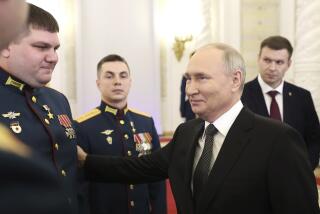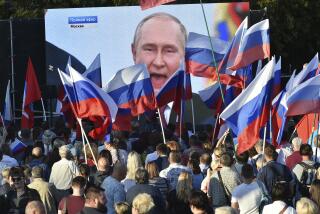Yeltsin Fights for His Life : Anti-reformist win could unravel aid from West
- Share via
The long-running power struggle between Boris N. Yeltsin and the Congress of People’s Deputies has culminated in a crushing defeat for the Russian president. By an overwhelming vote, Yeltsin has been stripped of virtually all of his executive powers, with new authority being assumed by a parliament heavily dominated by former communists and ultranationalist reactionaries. An ominous shadow now extends over the future of Russia’s economic reforms and, unavoidably, over Russia’s relations with the outside world.
A legislative reversal of the efforts made so far to push Russia toward a market economy would make moot the debate among the major industrialized countries--the G-7--over whether to expand and accelerate economic and technical aid to Russia. When all is said and done, a key aim of this proposed step-up in aid would be to strengthen Yeltsin in his struggle with the anti-reformist bloc by trying to ease the pains of economic change and demonstrating that a free market can yield broad tangible benefits. But if Yeltsin, stripped of his real powers, becomes only a figurehead and the reforms he exemplifies are abandoned, then the kind of help the West might have offered would be not just politically unwelcome in Russia but economically irrelevant as well.
Certainly the West can take small comfort in the ascendancy of Ruslan I. Khasbulatov, the chairman of the Congress and a shrewd and manipulative politician who has led the fight to downgrade Yeltsin’s powers and sabotage his reforms. The next scheduled legislative elections are in 1995. That gives Khasbulatov plenty of time to try to hammer together a durable coalition from among the Congress’ most conservative factions.
There is, to be sure, always the chance that Yeltsin--who led the opposition to the August, 1991, attempted coup d’etat that set in motion the final collapse of the Soviet Union--could try for something like his own coup.
He hasn’t shrunk from hinting that he might invoke extraordinary powers to override the actions of a Congress that, since it was chosen three years ago under Soviet electoral rules, can claim little in the way of democratic legitimacy. But a move by Yeltsin in effect to seize authoritarian powers could provoke open strife, with all the risks that presents to international stability. In this grim scenario the United States and other Western countries could find themselves with the momentous choice of supporting Yeltsin--thus choosing sides in a potential civil conflict--or remaining neutral in the face of a possible triumph by reactionary forces. Russia, no stranger to crises, again stands at a fateful political crossroads, and the world nervously waits to see what turning it will take.
More to Read
Sign up for Essential California
The most important California stories and recommendations in your inbox every morning.
You may occasionally receive promotional content from the Los Angeles Times.













